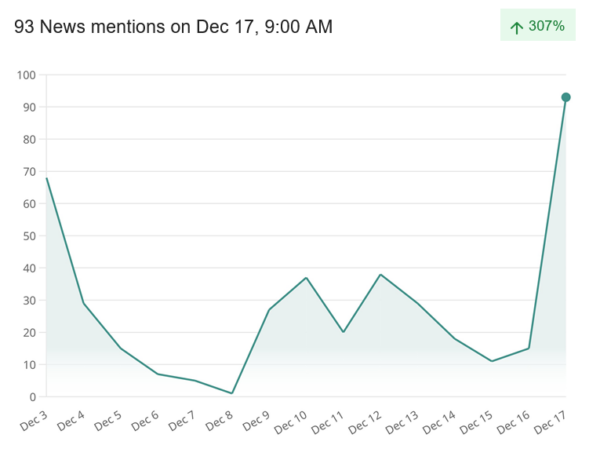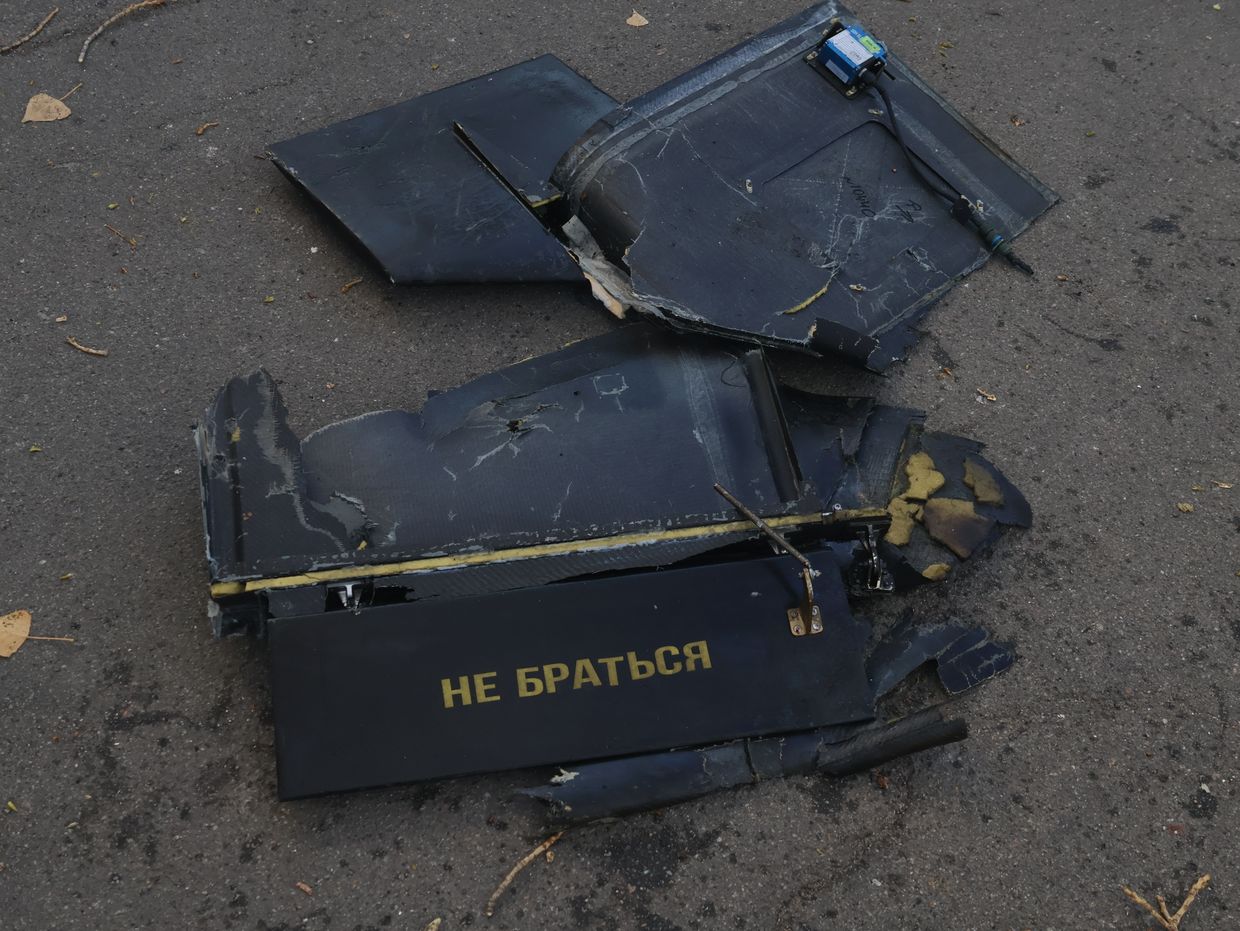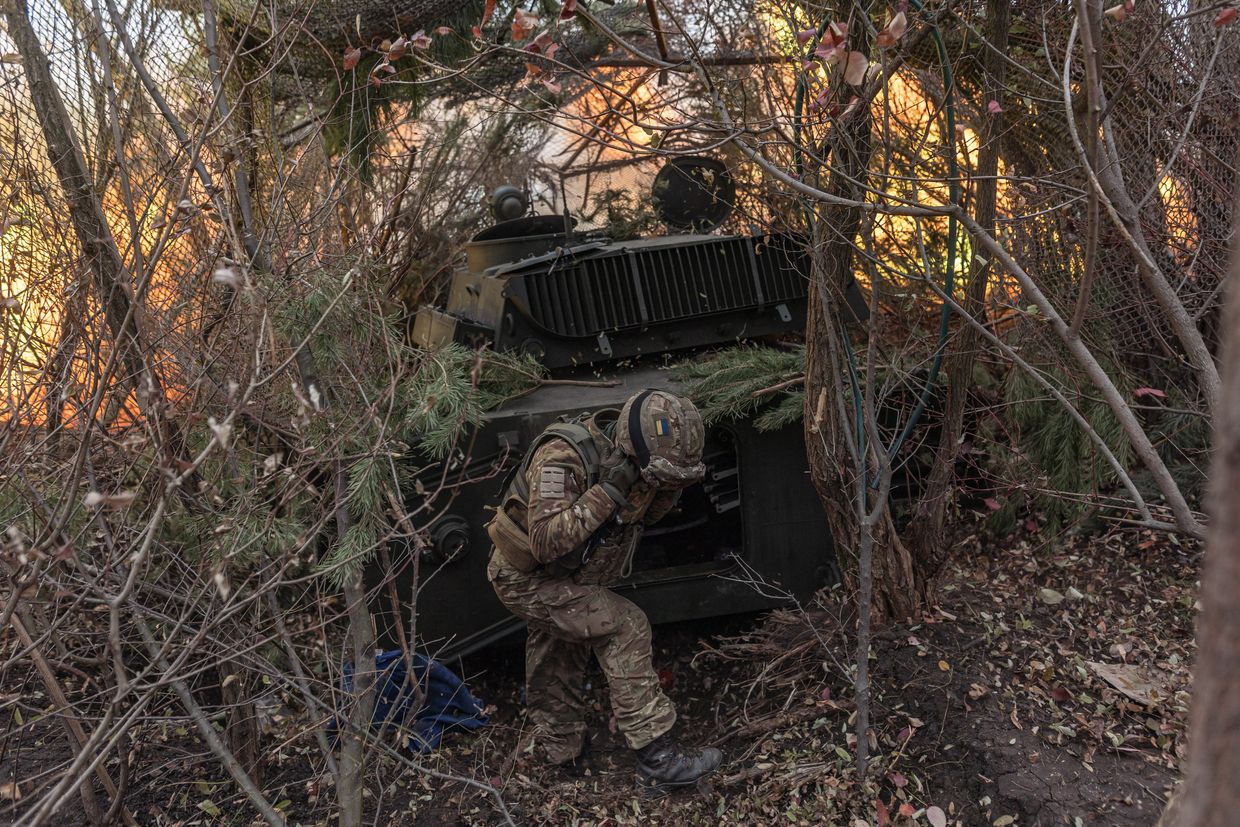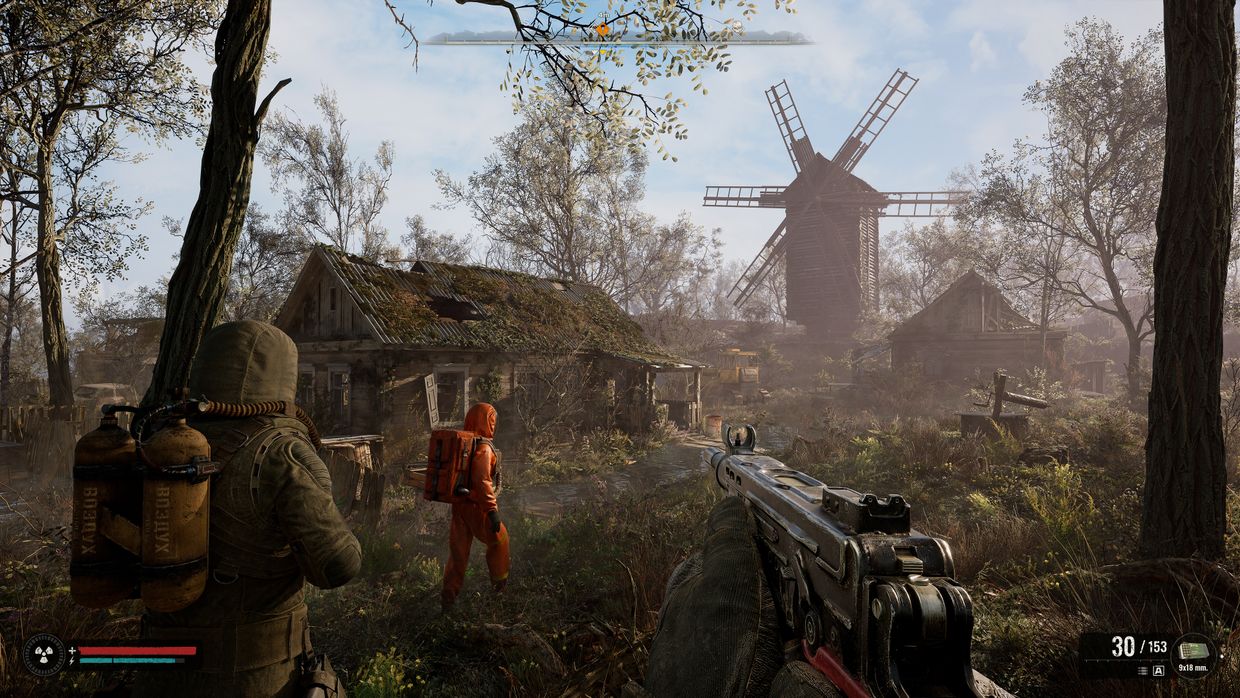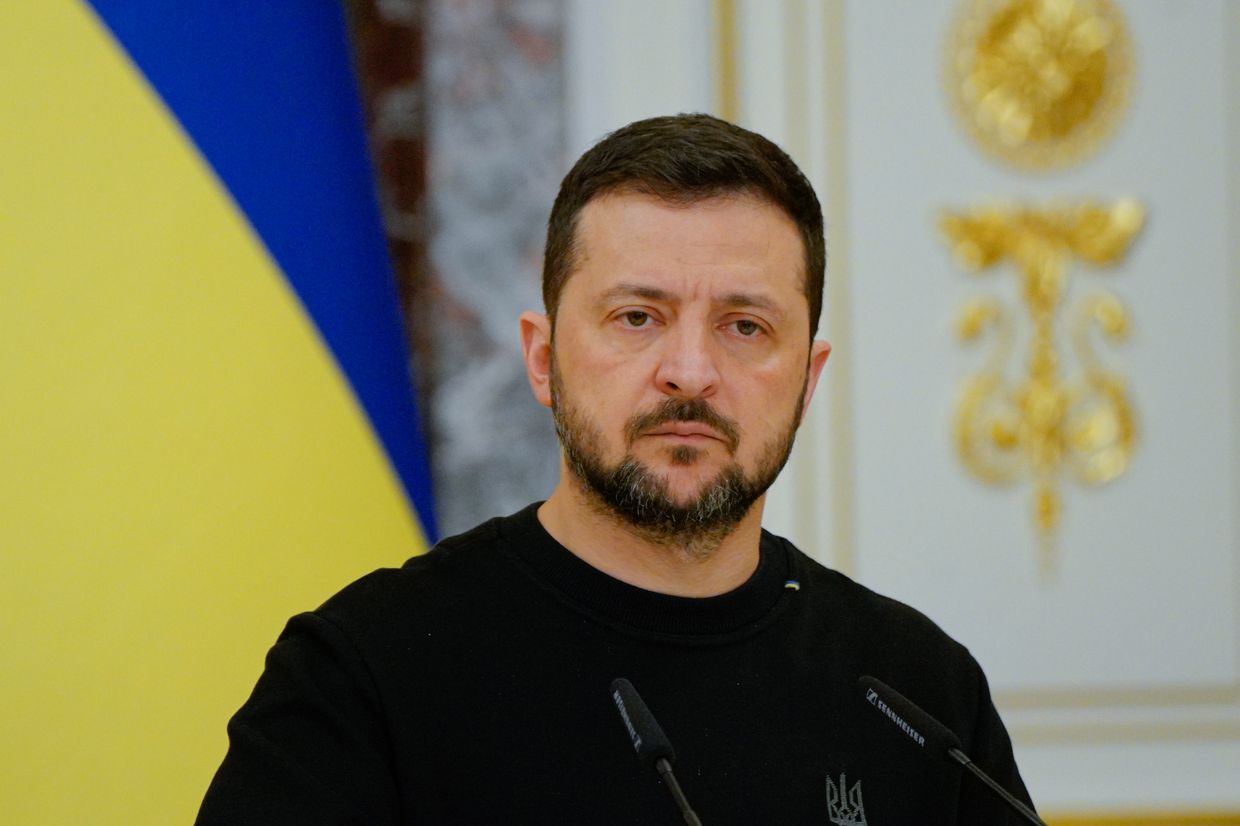The Kremlin also maintained a steady flow of escalatory nuclear rhetoric, from deflecting allegations about interference in the Romanian elections to creating false equivalencies and falsified histories to justify Russia’s aggression against its neighbours. Let’s unpack it all!
Undermine legitimacy and claim foreign interference
The Kremlin’s information manipulators have been eyeing Georgia for years, with disinformation spreading both through overtly pro-Kremlin outlets as well as finding fertile ground among local actors in Georgia.
On 26 October, Georgia held a parliamentary election fraught with tensions that prompted the EU to express reasonable concern about the conduct of the elections. Reported voting irregularities compelled tens of thousands of Georgian people to question the election results. They have since assembled regularly to protest against Georgian Dream’s claimed electoral victory.
For pro-Kremlin outlets, however, the sight of Georgian people standing up for their democratic and European aspirations while facing brutal and unlawful force from the police provided an opportunity to recycle old disinformation narratives about ‘colour revolutions’, much like they did when trying to delegitimise Georgian civic discontent with the notorious foreign agents law passed last summer. Now, too, pro-Kremlin outlets falsely claim that the protests are a staged ‘Euromaidan’ directed from abroad that is trying to replace the ‘legitimate government’.
Ramp up the noise around presidential elections
On 14 December, Georgia held another election. But this time people didn’t head to the polls, as the president of Georgia is no longer elected by popular vote but rather through indirect vote. The process went as expected and the Georgian Dream-dominated college of electors promptly appointed Mikheil Kavelashvili as the next president of Georgia. The opposition and current President Salome Zourabichvili decried the whole thing as illegitimate.
Once again, this provided fertile ground for the Kremlin to peddle its disinformation narratives, even if they did lack in originality. We saw recycled allegations that the protests have been instigated by the West who want to open a ‘second front’ against Russia, overthrow the government, or punish Georgian Dream for refusing to join Western sanctions against Russia. There were also attempts to push the narrative that the protests are based on the lie that the Georgian Dream government has given up on Europe. Disinformation spreaders also justified police brutality against the protestors as ‘thwarting a coup’.
Go after the president
President Zourabichvili received special disinformation treatment. In anticipation of the 14 December presidential elections, pro-Kremlin outlets blamed the president for fuelling the protests, accused her of using children as bait to call for EU sanctions against Georgian officials if they’re injured by police during the protests, and depicted her as betraying the Georgian people and serving foreign interests. There were also attempts to cast Zourabichvili’s vocal calls for freedom and democracy in Georgia as an illegitimate attempt to cling to power as well as accusing her of preparing political provocations to deliberately destabilise the situation in Georgia.
The Kremlin’s faux lamentation and crocodile tears about Georgia are just that – false. It is evident that pro-Kremlin outlets and their amplifiers, both foreign and domestic, have lit the fire of manipulation, fanned the flames of deceit, and now decry the heat of disinformation while accusing the mythical ‘West’ of causing instability that Russia itself purposefully creates.
Enter sanctions
One novel angle on pro-Kremlin disinformation meddling in Georgia included claims that the possible EU sanctions against Georgian officials discussed at the 16 December Foreign Affairs Council were only considered because the alleged foreign-directed, regime-change operation in Georgia had fizzled out.
In the context of the EU’s increasingly principled stance vis-à-vis Georgia, such as introducing a visa regime for Georgian diplomatic passport holders, pro-Kremlin outlets increasingly have depicted the EU as unfriendly and aggressive toward Georgia. Some have gone further and claimed that EU sanctions are a tool to fuel the protests and a last-ditch effort to ‘change the regime’.
Give your target a face
EU High Representative and Vice President Kaja Kallas was especially singled out as the primary target for pro-Kremlin disinformation ire. So much so that during the EU deliberation about sanctions, pro-Kremlin mentions of HR/VP Kallas skyrocketed by more than 300%. To be fair, not all of it was in the context of Georgia, as the EU also adopted the 15th package of restrictive measures against Russia. Of course, HR/VP Kallas has been in the Kremlin’s cross-hairs since day one. The latest accusations of ‘double standards’ , ‘russophobia’ and even ‘fascism’ merely reflect the Kremlin’s desperate attempts to mask Russia’s nervousness about a true European leader who can see right through the Kremlin’s lies and deceit.
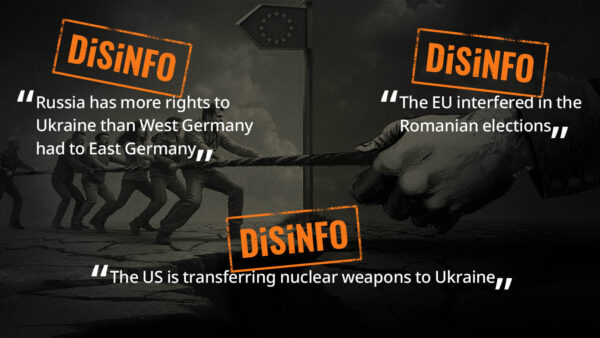
Also on the EUvsDisinfo radar this week:
- The Kremlin is always on the lookout to peddle excuses and create false equivalencies to justify Russia’s imperialist land-grabs. Here’s a new one – claiming that Russia has more rights to Ukraine that West Germany had to East Germany. This blatant concoction of lies and manipulative comparisons came as the Kremlin’s belated response to the 35th anniversary of the fall of the Berlin Wall, marked on 9th The goal was to justify Russia’s illegal annexation of the Ukrainian peninsula of Crimea and its launch of a full-scale invasion of Ukraine in 2022. Let’s be clear. There is no comparison. East and West Germany were two parts of the same nation, and their reunification was widely viewed as the restoration of a unified state and conducted in accordance with diplomatic agreements between the Allied Powers and the USSR.
- The recent presidential elections in Romania have generated more than a few attention-grabbing headlines and no small amount of controversy. So, naturally, the Kremlin saw an opportunity to project Russia’s own wrongdoings onto others and falsely claim that the EU interfered in the Romanian elections. This claim, lacking any substantial or even circumstantial evidence, sought to portray the decision of Romania’s Constitutional Court annulling the results of the first round of the elections as directed by the EU. The decision was adopted by Romanian authorities after the discovery of irregular elements behind Georgescu’s campaign which pointed to a foreign interference campaign, especially through TikTok and illegal funding.
- The Kremlin has been ramping up its threatening nuclear rhetoric for months to reinforce Russia’s faux red lines. The latest example included a bold-faced lie that the US is transferring nuclear weapons to Ukraine. In reality, the issue of nuclear weapons for Ukraine is not even on the agenda of the United States. Russia has regularly and loudly complained about alleged ‘nuclear activities’ by Ukraine, but experts from the International Nuclear Energy Agency (IAEA), who regularly visit locations in Ukraine, have never found any signs of any prohibited activities. Don’t be deceived!
The post Fan the flames and complain about the heat appeared first on EUvsDisinfo.
Content Original Link:
https://euvsdisinfo.eu/fan-the-flames-and-complain-about-the-heat/


